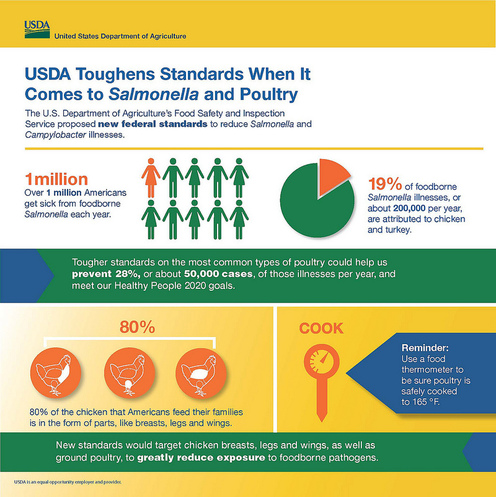Proper Handling of Baby Chicks & Eggs Can Prevent Salmonella
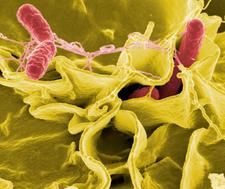
Images of salmonella infected eggs and egg shells, how to detect salmonella in chicken feces, proper handling of baby chicks, ducks, and other fowl, which baby chicks are most likely to be infected, how to prevent disease from spreading from baby chicks, people who are high risk for contracting salmonella, how to reduce the chances of contracting it, and much more...
Proper handling of baby chicks and eggs can prevent salmonella
Improper Handling of Baby Chicks Can Cause Diseases & Bacterial Infections "During the spring of 1999, outbreaks of salmonellosis associated with handling chicks and ducklings occurred in Michigan and Missouri. This report summarizes the epidemiologic information for the outbreaks and provides an overview of legislative efforts to control the distribution of chicks and ducklings.
These outbreaks demonstrate that handling chicks and ducklings is a health risk, especially for children, and highlight the need for thorough handwashing after contact with chicks, ducklings, and other young fowl. Read the Report http://www.cdc.gov/mmwr/preview/mmwrhtml/mm4914a1.htm
These outbreaks demonstrate that handling chicks and ducklings is a health risk, especially for children, and highlight the need for thorough handwashing after contact with chicks, ducklings, and other young fowl. Read the Report http://www.cdc.gov/mmwr/preview/mmwrhtml/mm4914a1.htm
Baby Chicks Which Are Most Likely To Be Infected With Salmonella & How to Prevent It
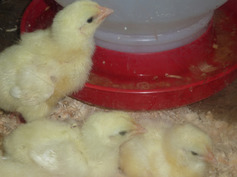
The most likely baby chicks to be infected with salmonella, infection, and bacterial disease are chicks which are purchased from commercial sources because they could be exposed to these diseases during shipping even if they have not contracted it at the commercial farm where they were hatched.
Studies indicate that baby chicks purchased from private owners with small flocks are less likely to carry disease or bacterial related infections.
How to Prevent Disease & Infections From Baby Chicks
Studies indicate that baby chicks purchased from private owners with small flocks are less likely to carry disease or bacterial related infections.
How to Prevent Disease & Infections From Baby Chicks
- Purchase chicks from individuals or owners of small flocks.
- Be careful when handling new baby chicks. Wear gloves and face mask.
- Quarantine baby chicks away from the rest of the flock for 30-60 days before introducing them to the flock.
- During quarantine watch for signs of illness. or parasites.
- Make sure baby chicks bedding, feed, and water containers are cleaned and changed daily to reduce the chances of contamination caused by feces in food or water.
How to Reduce Chances Of Salmonella In Eggs
Proper handling of eggs can prevent salmonella poisoning. Eggs should be collected daily and kept refrigerated. Eggs are safe from salmonella if handled properly.
Salmonella can appear on the inside and outside of eggs.
How to reduce the chances of salmonella in eggs
Salmonella can appear on the inside and outside of eggs.
How to reduce the chances of salmonella in eggs
- Collect eggs daily
- Keep eggs stored in the refridgerator until cooked.
- Eggs should be completely cooked and never eaten raw or lightly cooked.
- Eggs should be promptly consumed immediately after cooking. Read more...
How to detect Salmonella in Poultry Feces, What to look for:
"Typical Salmonella colony Morphologin Brilliant Green with Novobiocin: Typical colonies appear pink to white opaque colonies surrounded by red zones in the medium
Xylose Lysine Tergitol 4: Typical colonies appear black or black-centered with a yellow periphery after 18-24 hours of incubation.
Upon continued incubation, the colonies become entirely black or pink to red with black centers. Colonies of H2S negativeSalmonella strains appear pinkish yellow. View the Report
Xylose Lysine Tergitol 4: Typical colonies appear black or black-centered with a yellow periphery after 18-24 hours of incubation.
Upon continued incubation, the colonies become entirely black or pink to red with black centers. Colonies of H2S negativeSalmonella strains appear pinkish yellow. View the Report
Can you tell If an egg is contaminated with salmonella just by looking at the eggs? The Answer is NO, But...
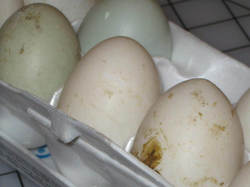
You cannot tell if an egg is contaminated with salmonella simply by looking with the naked eye.See images of salmonella under a microscope and published images of eggs with salmonella here:
Go to images of salmonella infected eggs
Go to images of salmonella infected eggs
People Subject to High Risk Are:
Young children
Elderly
People with weak immune systems
People who are infected with HIV
Elderly
People with weak immune systems
People who are infected with HIV
Legislative Efforts
"During February 2000, Centers for Disease Control (CDC) contacted 51 state and territorial public health departments to ascertain laws on the sale of baby fowl to noncommercial distributors and private persons; 28 (55%) responded.
Ten (36%) states have laws restricting the sale of baby fowl for noncommercial purposes, including the sale of fowl aged 3 weeks (Indiana and Maryland), age 4 weeks in (Ohio and Pennsylvania), age 8 weeks in(Massachusetts and Virginia), and age 12 weeks in (Connecticut).
In addition, Connecticut, Ohio, and Virginia require fowl to be sold in groups of greater than five birds. Illinois prohibits the sale of chicks during the Easter season, and Kansas requires persons to have a temporary or permanent license to sell chicks."
Ten (36%) states have laws restricting the sale of baby fowl for noncommercial purposes, including the sale of fowl aged 3 weeks (Indiana and Maryland), age 4 weeks in (Ohio and Pennsylvania), age 8 weeks in(Massachusetts and Virginia), and age 12 weeks in (Connecticut).
In addition, Connecticut, Ohio, and Virginia require fowl to be sold in groups of greater than five birds. Illinois prohibits the sale of chicks during the Easter season, and Kansas requires persons to have a temporary or permanent license to sell chicks."
Find Out More About Salmonella Prevention & Chickens
How to prevent and lessen the chances of contracting salmonella when raising chickens. According to the Centers for Disease Control the best way to prevent contracting salmonella from your backyard flock is to be sure to properly wash your hands with soap and water (use hand sanitizer if soap and water is unavailable) after handling chickens, their feces or touching anything that they use or where they live and be sure to supervise children during hand washing (CDC,2016). Go to Salmonella Prevention & Chickens
Salmonella Vaccinations for Chickens
Salmonella vaccinations for chickens can reduce the chances of contracting salmonella in eggs. Go to Vaccinations for Chickens
A Twisted Neck is A Big Sign That Your Chicken Has a Vitamin Deficiency
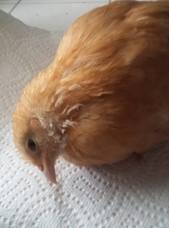 Wry Neck Syndrome-Vitamin Deficiency. CHOE 2017.
Wry Neck Syndrome-Vitamin Deficiency. CHOE 2017.
If you find your baby chick or chicken with a twisted neck, problems standing up and walking backwards, there is hope so do not kill your chicken. It is most likely caused by a vitamin deficiency and can be treated. Find out more here:
Is your chicken sick and you don't know what is wrong? See our Chicken Sickness & Treatment Chart
References: (Oct. 2008). Environmental sampling and detection of salmonella in poultry houses.U.S. Food and Drug Administration. (FDA). http://www.fda.gov/food/foodscienceresearch/laboratorymethods/ucm114716.htm

